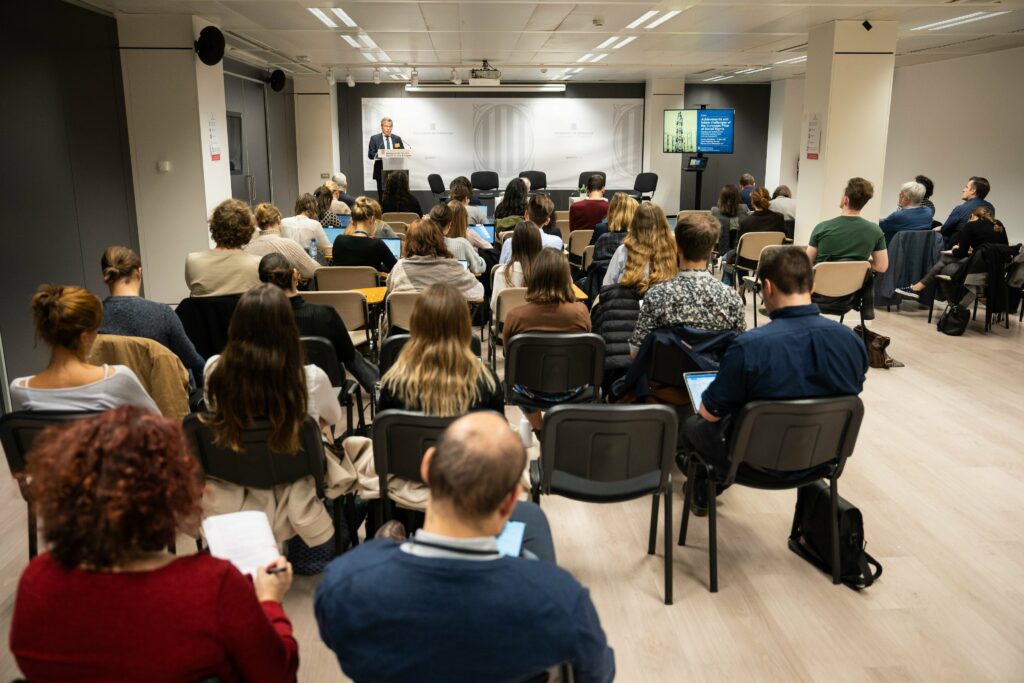Achievements and future challenges of the European Pillar of Social Rights
25/10/2023

On Monday 24 October, the Catalonian Government Delegation to the EU organised an event to discuss the main achievements and future challenges of the European Pillar of Social Rights, especially in the context of multiple crises that Europe is going through. EARLALL participated in this event to learn what its member region Catalonia is carrying out to advance the Pillar at the regional level.
The European Union approved the European Pillar of Social Rights in 2017 at the Gothenburg Summit. The Pillar sets out 20 key principles that guide Europe towards a strong, fair, inclusive and opportunity-filled social Europe in the 21st century. Cities and regions have an essential role in materialising the Principles into concrete actions that can benefit citizens.
Lluís Torrens, Secretary of Social Affairs and Families of the Government of Catalonia, opened the event by stressing that the region is facing two main challenges a demographic challenge (ageing society, welcoming of migrants and low birth rate) and access to housing.
Denis Genton, Director of the EU Pillar of Social Rights Strategy of the European Commission, explained that the Porto Summit in the spring 2021 approved the Pillar’s Action Plan which includes 75 concrete actions and three benchmark, among which that 60% of Europe’s adult population undertakes training once a year by 2030. The Pillar is still very relevant and most of its 75 actions have already been accomplished. However, the European Commission is aware that further cooperation in the area is needed and in the recently adopted 2024 European Commission Work Programme actions such as the workers’ right to disconnect, the quality framework of traineeships are mentioned. Mr Genton noted that one of the main challenges to making the Pillar actions real is the final transition and implementation by the Member States. The funding available through ESF+ or the Recovery and Resilience Facility can support regions and other stakeholders implement their strategies at local level. Finally, he highlighted some of Pillar’s main challenges such as the AI impact on labour, the green transition, digital nomads, access to housing and essential services and demographic challenges. On this last point, the European Commission is about to launch (mid-November 2023) a new initiative named the EU Talent Pool Pilot. This initiative encourages third-country nationals to enter the European labour market with legal contracts. In the European Commission plans are an assessment of the Pillar and a renewed Action Plan by 2025. Mr Genton stressed the importance to exchange views with social partners and different stakeholders in the field. He announced that a consultation process will be supported to gather views from different actors and that two main conferences will be organized, the EU Social Forum in November 2023 and a conference on lifelong learning in April 2024 organised by the Belgian Presidency to the EU.
Panellists shared their views on how to address the current and future challenges of the Pillar. Robbie Stakelum (Social Platform) highlighted the importance of looking into specific consequences of the twin transition for vulnerable people. Michaela Lednova (Eurocites) emphasised the insufficient funding for implementing the Pillars actions. Lluís Torrens said that to face societal challenges a lifelong learning approach is needed as there is an immense problem of people lacking the skills that the labour market needs. Denis Genton added that the European Commission is paying special attention to the fairness of the green transition and that the different Directorates of the European Commission are working together to bear in mind this.
The event underlined that cities and regions are those who are the ones who can better implement the concrete actions of the Pillar. They have a privileged role as they know better the problems of citizens and how to address them.




